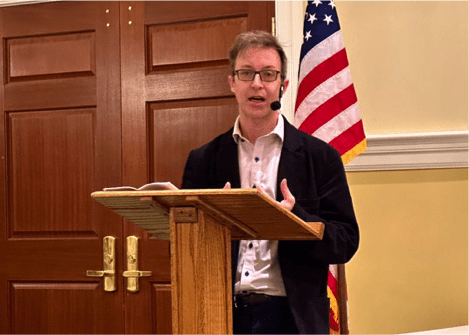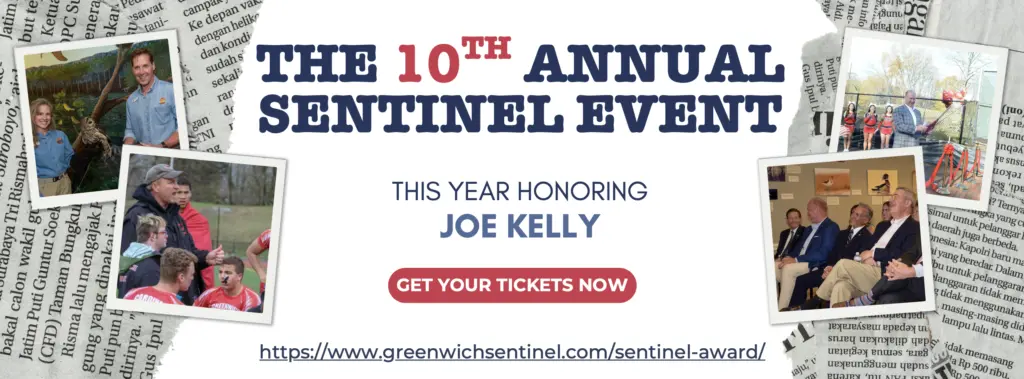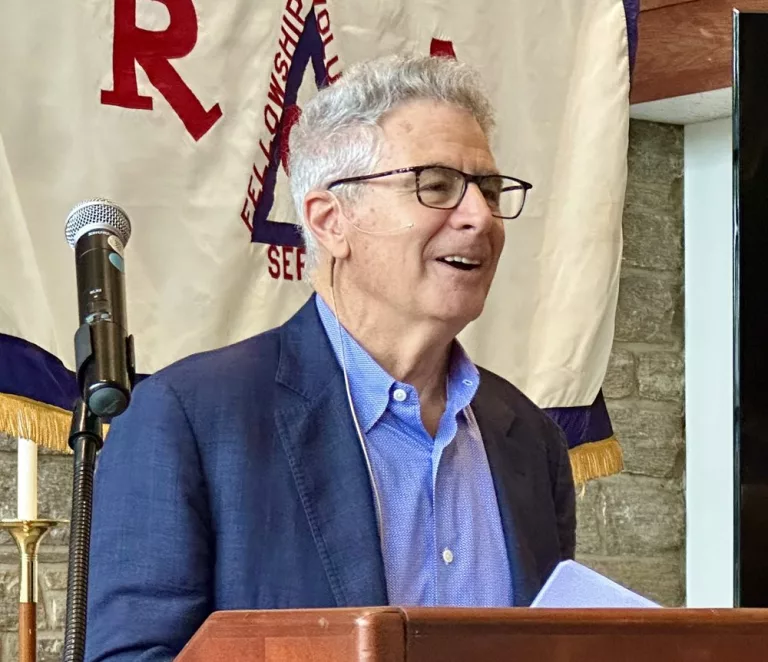RMA Presents: The Nation That Never Was – Reconstructing America’s Story

By Av Rivel
At the Retired Men’s Association (RMA) meeting on November 30th, Horst Tebbe introduced as the speaker of the day Kermit Roosevelt III who is a Professor of Constitutional Law at the University of Pennsylvania School of Law, a former clerk for Supreme Court Justice, David Souter, the author of several fiction and non-fiction books as well as the great-great grandson of President Theodore Roosevelt.
Professor Roosevelt started his talk by demonstrating a dichotomy in the understanding of five words in the Declaration of Independence, “all men are created equal.” To the Founders who were denying the divine right of kings, these five words meant that no man was greater than his neighbor and had the implicit right to rule over him. To the Founders, Roosevelt maintained, “men” meant white males to the exclusion of women and people of color, and slavery was OK.
To Abraham Lincoln, about hundred years later, and as embodied in the 14th amendment, the phrase “all men are created equal” meant that governments have an obligation to treat all of their citizens equally. There could not be separate laws for some citizens.
In his new book, The Nation That Never Was–Reconstructing America’s Story, Roosevelt argues that there is a common story we tell about America, that our fundamental values as a country were stated in the Declaration of Independence, fought for in the Revolution, and made law in the Constitution. But, with the country increasingly divided, Roosevelt believes this story isn’t working for us anymore—and what’s more, he said, it’s not even true. Roosevelt argues in his reinterpretation of the American story that our fundamental values, particularly equality, were not part of the vision of the Founders. Instead, they were stated in Lincoln’s Gettysburg Address and were the hope of Reconstruction, when it was possible to envision the emergence of the nation committed to liberty and equality.
Roosevelt stated that we face a dilemma these days. We want to be honest about our history and the racism and oppression that Americans have both inflicted and endured. But we want to be proud of our country, too. In his book, Roosevelt shows how we can do both those things by realizing that we’re not the country we thought we were. Reconstruction, he argues, was not a fulfillment of the ideals of the founding of America but rather a repudiation: we modern Americans are not the heirs of the Founders but of the people who overthrew and destroyed that political order that started with Lincoln’s Gettysburg Address. This alternate understanding of the American identity according to Roosevelt opens the door to a new understanding of ourselves and our story, and ultimately to a better America.
A spirited RMA Q&A followed Roosevelt’s talk.
To see Professor Roosevelt’s full presentation, go to https://greenwichrma.org/ and click on “Speakers.”
The RMA’s next presentation “How Jazz and Blues Revolutionized American Culture in the 1920’s” will focus on African American-derived music in the form of jazz and blues that exploded into mainstream American culture one hundred years ago. Using original recordings as examples, author Tim Brooks will trace how and why during a relatively short period of time the relatively staid, Victorian sounds of the 19th and early 20th centuries era gave way to a multiplicity of musical currents that became truly “America’s music.” It was a period of institutionalized discrimination and segregation, yet black artists such as Duke Ellington, Louis Armstrong, Eubie Blake, Fats Waller, Ethel Waters and others became major stars. White artists too embraced the new sounds, including Paul Whiteman, Ted Lewis, and the Original Dixieland Jazz Band. Jazz even invaded the concert hall, with the historic debut of George Gershwin’s “Rhapsody in Blue” in 1924.
In time jazz and blues would influence each other and morph into such styles as big band swing, western swing, modern jazz, rhythm and blues and rock ‘n’ roll. But it all began in the tumultuous 1920s, when after years or being suppressed or ignored, African American cultural sensibilities became part of mainstream America.
Tim Brooks is the author of nine books on media history, including Lost Sounds: Blacks and the Birth of the Recording Industry: 1890-1919, which lays the groundwork for this era, and The Blackface Minstrel Show in Mass Media: 20th Century Performances on Radio, Records, Film and Television. His books have won many awards, including the American Book Award and the ASCAP Deems Taylor Award for best book on music. He has also produced a number of reissue CDs, is a three-time Grammy nominee and won a Grammy Award for Best Historical Reissue for the companion CD to Lost Sounds. He is the current president of the Association for Recorded Sound Collections, a national organization of recording scholars and archivists.
This presentation will occur on Wednesday, December 14, at 11:00 a.m. at the First Presbyterian Church in Greenwich as well as on webinar at: https://bit.ly/30lBj21.
Note: The views expressed in these presentations are those of the speakers. They are not intended to represent the views of the RMA or its members.
RMA speaker presentations are presented as a community service at no cost to in-person or Zoom attendees. The RMA does request that all eligible individuals consider becoming a member of our great organization, and thereby enjoy all the available fellowship, volunteer and community service opportunities that the RMA offers to its members. For further information, visit www.greenwichrma.org or contact Joe Mancinelli (mailto:jlmanc@optonline.net) or Peter Stern (mailto:members@greenwichrma.org).





